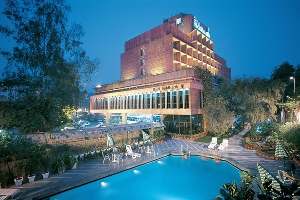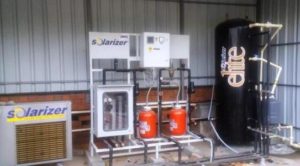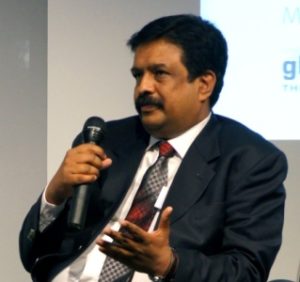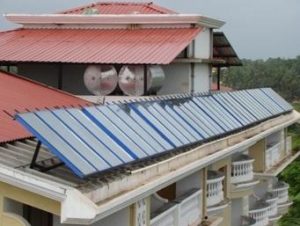India: Best Practise Applications for Hotels
March 16, 2010
JP Siddhartha Hotel
 Profiting from cost-effective solar thermal technology: The JP Siddhartha Hotel in the city of Gurgaon, Haryana, runs a 56 m2 collector system supplying solar energy for the domestic hot water demand of the hotel. The investment of INR 490,000 will pay off in less than 2 years.
Profiting from cost-effective solar thermal technology: The JP Siddhartha Hotel in the city of Gurgaon, Haryana, runs a 56 m2 collector system supplying solar energy for the domestic hot water demand of the hotel. The investment of INR 490,000 will pay off in less than 2 years.
Photo: http://www.jaypeehotels.com
According to a presentation held by Indian solar thermal system manufacturer Emmvee Solar Systems Pvt Ltd in New Delhi in December 2009, the common payback period for solar systems in Indian hotels ranges between two and three years. The company presentation providing key figures for several installations of solar thermal systems in hotels in India can be found attached to this node.
| Hotel |
Best Western |
JP Siddhartha Hotel |
| Location, State |
Gurgaon, Haryana |
Gurgaon, Haryana |
| Number of rooms |
400 |
94 |
| Installation year of the solar thermal system |
2008 |
2008 |
| Generated volume |
14,250 litres per day |
3,500 litres per day |
| Collector area (62 litres per day/m2) |
228 m2 |
56 m2 |
| System Type |
Thermosiphon |
Pumped system with boiler backup |
| Application |
Hot water supply for bathrooms and kitchen |
Hot water supply for bathrooms |
| System Costs |
2,775,000 INR |
490,000 INR |
| System Costs |
44,312 EUR |
7,824 EUR |
| Specific costs per m2 of collector area |
194 EUR / m2 |
140 EUR / m2 |
| Savings of electricity |
775 kWh / day |
175 kWh / day |
| Savings (5 INR per kWh, with 340 days per year) |
1,317,500 INR / year |
297,500 INR / year |
| Payback Period |
2.1 years |
1.7 years |
Key figures for two of Emmvee’s solar thermal system installations in hotels. INR stands for Indian Rupees.
Source: Emmvee
The table above shows two cases from the city of Gurgaon: The Best Western Resort Hotel, one of the largest hotel complexes in the Gurgaon NCR region with 400 rooms, and the JP Siddhartha Hotel in the same region with 94 rooms. Originally, these hotels used electricity and a diesel boiler to cover their hot water demand.
Emmvee calculates payback periods by the following formula: electricity savings through the installed solar thermal systems times the average electricity costs of 5 INR/kWh. “The exact pay back time depends on the system costs and the electricity tariff,” Vijay Kumar, Head of Marketing and Sales at Emmvee, explains. “Most hotels choose a 70% room occupancy as the limit for covering hot water demand by solar thermal systems.”
Emmvee Solar was established in 1992 and, all in all, employs 500 people. Its new plant in Bangalore includes a factory for tempering glass, as well as a tank and a collector production unit.
More information:
http://www.emmveesolar.com
Text was written in cooperation with communication specialist Hanna Schober, based in South Africa. Schober@solrico.com


